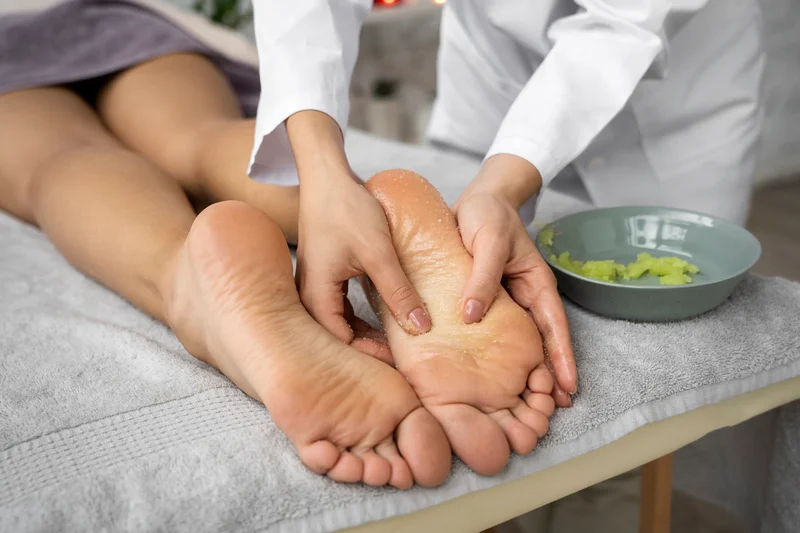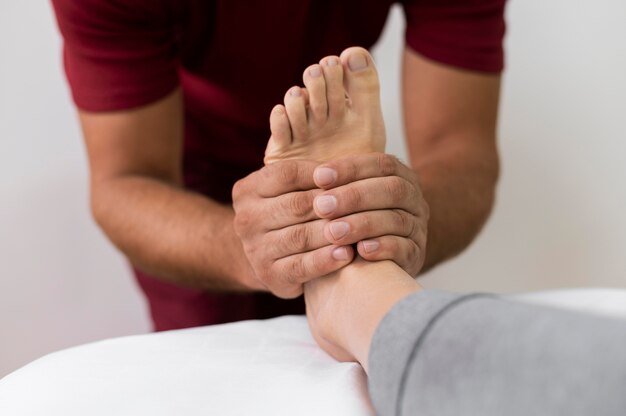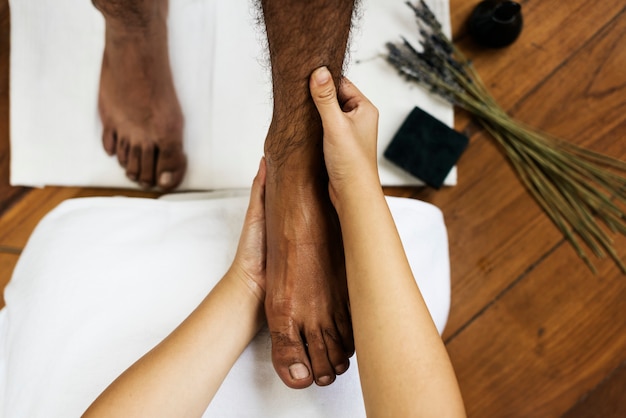Ask Ayurvedic doctor a question and get a consultation online on the problem of your concern in a free or paid mode. More than 2,000 experienced doctors work and wait for your questions on our site and help users to solve their health problems every day.
Ayurvedic Medicine for Peripheral Neuropathy – Natural Remedies for Nerve Health

Introduction to Ayurvedic Medicine for Peripheral Neuropathy
Peripheral neuropathy is a condition characterized by damage to the peripheral nerves, leading to symptoms such as pain, numbness, tingling, and weakness, primarily in the hands and feet. Traditional Ayurvedic medicine offers a holistic approach to managing peripheral neuropathy by addressing the root causes, balancing the body's doshas, and enhancing overall nerve health. By integrating Ayurvedic remedies, dietary adjustments, and lifestyle modifications, individuals can find natural relief from nerve discomfort and improve their quality of life.
Historical Roots & Ayurvedic Significance
Ayurveda, the ancient Indian system of medicine, emphasizes the balance of the three doshas—Vata, Pitta, and Kapha—for maintaining health and preventing disease. Peripheral neuropathy is primarily associated with an imbalance in the Vata dosha, which governs movement and nerve function. According to Ayurvedic texts, excessive Vata can lead to dryness, rigidity, and impaired nerve conduction, contributing to neuropathic symptoms. Ayurvedic treatments aim to pacify Vata through herbal therapies, dietary changes, and detoxification processes, thereby restoring nerve function and alleviating symptoms.
Key Components & Therapeutic Benefits
1. Herbal Composition
Ayurvedic management of peripheral neuropathy involves a combination of herbs known for their neuroprotective, anti-inflammatory, and circulation-enhancing properties:
- Ashwagandha (Withania somnifera): Enhances nerve regeneration and reduces oxidative stress.
- Brahmi (Bacopa monnieri): Improves cognitive function and nerve health.
- Turmeric (Curcuma longa): Contains curcumin, which has potent anti-inflammatory and antioxidant effects.
- Guggulu (Commiphora mukul): Promotes circulation and detoxification.
- Mucuna Pruriens (Velvet Bean): Provides natural levodopa, supporting dopamine production and nerve function.
2. Detoxification & Dosha Balancing
Peripheral neuropathy in Ayurveda is linked to the accumulation of ama (toxins) and an imbalance in Vata dosha. Ayurvedic treatments focus on detoxifying the body through Panchakarma therapies such as Virechana (therapeutic purgation) and Basti (medicated enemas). These procedures help eliminate toxins, reduce Vata imbalance, and improve nutrient absorption, thereby supporting nerve health and reducing neuropathic symptoms.
3. Applications in Nerve & Circulatory Health
Ayurvedic remedies for peripheral neuropathy target both nerve and circulatory systems:
- Nerve Health: Herbs like Ashwagandha and Brahmi support nerve regeneration, reduce nerve inflammation, and enhance neurotransmitter function.
- Circulatory Health: Guggulu and Turmeric improve blood circulation, ensuring adequate oxygen and nutrient delivery to peripheral nerves.
- Pain Relief: Natural analgesics found in these herbs help alleviate pain and discomfort associated with nerve damage.
- Overall Wellness: Dietary modifications and lifestyle changes complement herbal treatments, promoting holistic health and preventing further nerve damage.
4. Integration with Ayurvedic Therapies
Integrating herbal treatments with Ayurvedic therapies enhances the effectiveness of managing peripheral neuropathy:
- Panchakarma: Detoxification procedures remove ama and balance doshas, creating a conducive environment for healing.
- Abhyanga (Oil Massage): Promotes circulation, reduces Vata imbalance, and soothes nerve pain.
- Swedana (Herbal Steam Therapy): Helps in loosening tissues, improving blood flow, and reducing nerve stiffness.
- Yoga & Meditation: Incorporates gentle exercises and mindfulness practices to enhance nerve function and reduce stress, which can exacerbate neuropathic symptoms.
How Ayurvedic Management Works: The Science Behind the Approach
Ayurvedic management of peripheral neuropathy operates on the principle of restoring balance within the body. The use of neuroprotective herbs like Ashwagandha and Brahmi supports nerve regeneration and reduces oxidative damage. Anti-inflammatory agents in Turmeric and Guggulu decrease inflammation around nerves, improving their function. Detoxification therapies eliminate ama, reducing nerve irritation and enhancing nutrient absorption necessary for nerve health. Additionally, improving blood circulation ensures that peripheral nerves receive adequate oxygen and nutrients, facilitating healing and reducing neuropathic symptoms.
Choosing the Right Ayurvedic Remedies & Guidance
When selecting Ayurvedic remedies for peripheral neuropathy, consider the following to ensure efficacy and safety:
- Consult Certified Ayurvedic Practitioners: Personalized treatment plans based on your Prakriti (constitution) and specific health needs ensure effective management.
- Ensure High-Quality Herbs: Opt for formulations made from organic and authentic herbs to maximize therapeutic benefits and minimize contaminants.
- Source from Reputable Vendors: Purchase Ayurvedic supplements from trusted pharmacies or certified practitioners to guarantee product quality and proper formulation.
- Consider Comprehensive Approaches: Combine herbal treatments with dietary and lifestyle modifications for a holistic management plan.
Recommended Dosage & How to Use Ayurvedic Remedies for Peripheral Neuropathy
The appropriate dosage of Ayurvedic remedies varies based on individual health conditions and constitutional types. Generally, the guidelines are as follows:
- Herbal Supplements:
- Ashwagandha: 1-2 grams of powder or as recommended by a practitioner.
- Brahmi: 300-500 mg capsules taken twice daily.
- Turmeric: 1 teaspoon of powder daily or in capsule form.
- Guggulu: 500 mg twice daily with meals.
- Mucuna Pruriens: 500 mg capsules taken once daily.
- Panchakarma Therapies:
- Undergo Virechana and Basti as prescribed by an Ayurvedic practitioner, typically performed in cycles.
- Consumption: Herbal supplements can be taken with warm water or as directed by a practitioner. Always follow the recommended dosage and consult with a healthcare provider before starting any new treatment.
- Dietary & Lifestyle Adjustments: Incorporate a balanced diet rich in vitamins B12 and E, engage in regular gentle exercise, and practice stress-reducing techniques like yoga and meditation.
Potential Side Effects & Precautions
While Ayurvedic remedies are generally safe when used appropriately, consider the following precautions:
- Digestive Sensitivity: Some herbs may cause mild gastrointestinal discomfort. Start with lower doses to assess tolerance.
- Pregnancy & Nursing: Pregnant or breastfeeding women should consult an Ayurvedic practitioner before using herbal supplements.
- Allergic Reactions: Discontinue use if any allergic reactions or adverse symptoms occur and seek medical advice.
- Interactions with Medications: Inform your healthcare provider about any Ayurvedic treatments you are undergoing to avoid potential interactions with other medications.
- Quality Control: Ensure that herbs are sourced from reputable vendors to prevent contamination with heavy metals or adulterants.
Frequently Asked Questions (FAQ)
What is peripheral neuropathy?
Peripheral neuropathy is a condition resulting from damage to the peripheral nerves, leading to symptoms such as pain, numbness, tingling, and weakness, primarily in the hands and feet. It can be caused by various factors, including diabetes, infections, injuries, and exposure to toxins.
How does Ayurveda treat peripheral neuropathy?
Ayurveda treats peripheral neuropathy by balancing the doshas, particularly Vata, eliminating toxins (ama), and using a combination of neuroprotective herbs, detoxification therapies, and lifestyle modifications to support nerve health and alleviate symptoms.
What are the common Ayurvedic herbs used for peripheral neuropathy?
Common Ayurvedic herbs include Ashwagandha, Brahmi, Turmeric, Guggulu, and Mucuna Pruriens. These herbs possess neuroprotective, anti-inflammatory, and circulation-enhancing properties that help manage peripheral neuropathy.
Can dietary changes help manage peripheral neuropathy in Ayurveda?
Yes, Ayurveda emphasizes a balanced diet tailored to your constitution. Consuming foods rich in vitamins B12 and E, avoiding processed and inflammatory foods, and incorporating warm, easily digestible meals can support nerve health and reduce neuropathic symptoms.
What Ayurvedic therapies are recommended for peripheral neuropathy?
Recommended therapies include Panchakarma detoxification procedures, Abhyanga (oil massage), Swedana (herbal steam therapy), and Yoga practices. These therapies help eliminate toxins, improve circulation, reduce Vata imbalance, and enhance overall nerve function.
How long does it take to see results from Ayurvedic treatments for peripheral neuropathy?
The timeframe varies based on individual health conditions and adherence to the treatment plan. Some individuals may notice improvements within a few weeks, while others might require several months for significant changes. Consistency and personalized care are key to effective management.
Are there any lifestyle modifications recommended in Ayurveda for peripheral neuropathy?
Yes, Ayurveda recommends regular gentle exercise, stress management techniques like yoga and meditation, adequate sleep, and maintaining a balanced lifestyle to support overall health and manage peripheral neuropathy effectively.
Conclusion & Expert Insights
Peripheral neuropathy is a complex condition that affects the nerves, leading to significant discomfort and impaired quality of life. Ayurvedic medicine offers a comprehensive and natural approach to managing peripheral neuropathy by addressing the root causes, balancing doshas, and enhancing nerve health through herbal remedies, detoxification therapies, and lifestyle modifications. By consulting with qualified Ayurvedic practitioners and adhering to personalized treatment plans, individuals can achieve sustained relief from neuropathic symptoms and improve their overall well-being. Embracing the holistic principles of Ayurveda fosters long-term nerve health and harmony within the body.
References & Further Reading
- Gupta, A.K., & Lories, R.J. (2017). Psoriatic Arthritis: Pathogenesis and Clinical Implications. Springer.
- Sharma, P.V. (1995). Ayurvedic Healing: A Comprehensive Guide. Motilal Banarsidass Publishers.
- Lad, V. (2002). Ayurveda: The Science of Self-Healing. Lotus Press.
- National Institute of Neurological Disorders and Stroke. (2021). Peripheral Neuropathy.
- Chandran, B., & Goel, A. (2012). "A randomized, double-blind, placebo-controlled study of curcumin in patients with active rheumatoid arthritis." Phytotherapy Research, 26(11), 1719-1725. https://doi.org/10.1002/ptr.4646
- Aggarwal, B.B., & Harikumar, K.B. (2009). "Potential of curcumin in immunomodulation and cancer therapy." International Journal of Biochemistry & Cell Biology, 41(1), 40-49. https://doi.org/10.1016/j.biocel.2008.07.022



